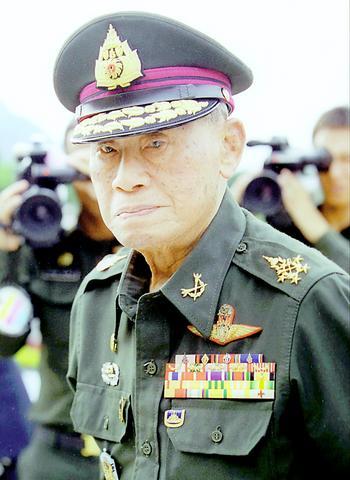Thanom Kittikachorn, a former prime minister whose military regime was ousted from office by a popular uprising in 1973, has died, the state-run news agency said. He was 92.
Thanom died of shock and heart failure late Wednesday after spending five months at Bangkok Hospital, the Thai News Agency reported, citing a hospital announcement early yesterday morning.
Thanom came to be popularly reviled as one of the country's "Three Tyrants" when he ran the country as a military dictatorship in a triumvirate in the 1960s and early 1970s with Field Marshal Praphas Charusathien and Colonel Narong Kittikachorn, Thanom's son and Praphas' son-in-law.

PHOTO: AFP
Thanom, who also held the rank of field marshal, was generally seen as the more conciliatory partner, and Praphas the hardliner.
The three were driven into exile following a bloody student-led uprising in October 1973.
They were accused of nepotism, massive corruption and ordering the massacre of protesters in the streets of Bangkok during the uprising.
A brief period of raucous democracy followed, which many influential and conservative Thais found unsettling, and feared would lead to a communist takeover similar to those that occurred in Vietnam, Laos and Cambodia in 1975.
Thanom was allowed to return to Thailand in late 1976 to serve as a Buddhist monk, sparking new demonstrations by pro-democracy protesters. Many believe his return was meant to set the stage for a counterrevolution, and on Oct. 6, 1976, a massacre of student protesters by police and the army took place at Bangkok's Thammasat University, and a coup installed a new, military-guided right-wing government.
Neither Thanom nor his two former partners in rule resumed any public political role. Thanom generally kept a low public profile afterward, though over the past decade, he made an effort to rehabilitate his public image -- arguing that he was not responsible for the violence unleashed on the 1973 protesters -- and sought to recover some property seized when he was overthrown. Praphas died in 1997.
Thanom was born Aug. 11, 1911 in the northern province of Tak. He attended Army Cadet Academy and his move up the ranks was accelerated after he took part in a 1947 coup.
During the 1950s Thanom served as deputy defense minister and defense minister, and was appointed a figurehead prime minister for nine months in 1958 before military strongman Sarit Thanarat assumed dictatorial powers until his death in 1963.
Thanom's regime -- like Sarit's -- was close to the US because of their shared drive against communism, and massive corruption. During the Vietnam War, his government allowed tens of thousands of US servicemen to be stationed in the country. The US bases were closed after his government was overthrown.
His government allowed a veneer of democracy, but even the mild dissent proved unacceptable to it, and it staged a coup against itself in 1971 to sweep away peaceful but pesky opponents in parliament. However, the high-handed tactic sharpened opposition to his rule, leading to the 1973 student revolution.

Shamans in Peru on Monday gathered for an annual New Year’s ritual where they made predictions for the year to come, including illness for US President Donald Trump and the downfall of Venezuelan President Nicolas Maduro. “The United States should prepare itself because Donald Trump will fall seriously ill,” Juan de Dios Garcia proclaimed as he gathered with other shamans on a beach in southern Lima, dressed in traditional Andean ponchos and headdresses, and sprinkling flowers on the sand. The shamans carried large posters of world leaders, over which they crossed swords and burned incense, some of which they stomped on. In this

Near the entrance to the Panama Canal, a monument to China’s contributions to the interoceanic waterway was torn down on Saturday night by order of local authorities. The move comes as US President Donald Trump has made threats in the past few months to retake control of the canal, claiming Beijing has too much influence in its operations. In a surprising move that has been criticized by leaders in Panama and China, the mayor’s office of the locality of Arraijan ordered the demolition of the monument built in 2004 to symbolize friendship between the countries. The mayor’s office said in

‘TRUMP’S LONG GAME’: Minnesota Governor Tim Walz said that while fraud was a serious issue, the US president was politicizing it to defund programs for Minnesotans US President Donald Trump’s administration on Tuesday said it was auditing immigration cases involving US citizens of Somalian origin to detect fraud that could lead to denaturalization, or revocation of citizenship, while also announcing a freeze of childcare funds to Minnesota and demanding an audit of some daycare centers. “Under US law, if an individual procures citizenship on a fraudulent basis, that is grounds for denaturalization,” US Department of Homeland Security Assistant Secretary Tricia McLaughlin said in a statement. Denaturalization cases are rare and can take years. About 11 cases were pursued per year between 1990 and 2017, the Immigrant Legal Resource

‘RADICALLY DIFFERENT’: The Kremlin said no accord would be reached if the new deal with Kyiv’s input did not remain within the limits fixed by the US and Russia in August Ukrainian President Volodymyr Zelenskiy is to meet US President Donald Trump in Florida this weekend, but Russia on Friday accused him and his EU backers of seeking to “torpedo” a US-brokered plan to stop the fighting. Today’s meeting to discuss new peace proposals comes amidst Trump’s intensified efforts to broker an agreement on Europe’s worst conflict since World War II. The latest plan is a 20-point proposal that would freeze the war on its current front line, but open the door for Ukraine to pull back troops from the east, where demilitarized buffer zones could be created, according to details revealed by